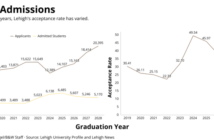
Sam Topp
Iran. Libya. Somalia. Sudan. Syria. Yemen.
Citizens and refugees from these countries are banned from traveling to the U.S. under the newest executive order regarding immigration. All are Muslim-majority countries, and no terrorist attacks have originated from their respective citizens.
While I might find it natural to look at these facts and denounce the ban as racially motivated, I don’t necessarily represent a large portion of the country in my views. Immigration is a tough topic to approach in a strictly logical way.
Within a political realm, immigration encompasses two further issues — the refugee crisis and illegal travel across our borders. Both are highly controversial and are associated with emotional arguments from each side.
Manny, my conservative counterpart in the debate, said his parents were immigrants and learned values of hard work and determination.
“Immigration, when done properly, can be a very beautiful thing,” Manny said. “As a society, it is important that the naturalized citizen is given the same respect as the natural born citizen.”
Not only do I agree, but I can relate through my family’s history. My grandparents were immigrants who fled Europe from what would become World War II. And yet, I find it hard to see how these motivations manifest themselves into the recent immigration policy.
The executive order issued by the White House said, “Deteriorating conditions in certain countries due to war, strife, disaster, and civil unrest increase the likelihood that terrorists will use any means possible to enter the United States.”
In reality, the order would not have done anything to prevent any terrorist attacks in the United States since 9/11. According to the Washington Post, all attacks since 2001 have originated from citizens born in six different countries: Egypt, Kuwait, Kyrgyzstan, Pakistan, Saudi Arabia, the United Arab Emirates and the United States itself.
I understand the need for protective measures to be put in place, but I fundamentally disagree with punishing specific countries who have not proven themselves to be a threat, while letting others off the hook.
Manny said while he doesn’t completely agree with the new order, some regions of the world pose a threat to the U.S. and should have citizens go through extreme vetting to enter the country. He also said it is not just a Republican idea, considering that Jimmy Carter, a Democratic president, issued a similar ban on Iran during the hostage crisis between 1979 and 1981.
“Our country has every right to let in who it pleases, as each nation has sovereignty over its borders,” Manny said.
Just as in foreign diplomacy, our country also has the right to determine its own immigration procedures. One area that needs to be addressed is illegal immigration. Manny and I agree that illegal immigration, by the nature of its name, is a problem of pressing importance.
“There is nothing racist or xenophobic about enforcing our immigration laws because illegal is illegal, regardless of origin,” Manny said. “However, I do believe that the system can be made better.”
He said we should be working toward incentivizing legal immigration. Immigrants are an important part of our economy, providing services such as work in agricultural and construction fields for wages the average American citizen might be unwilling to accept.
However, many current Republicans argue both legal and illegal immigration negatively affects the work force.
A new law proposed by Republican senators Tom Cotton and David Perdue aims to “get our immigration levels back to historical norms . . . to allow the economy to catch up with the immigrants that we have allowed into our country over the last two generations.”
This belief is in direct opposition to data showing that immigrants — high- or low-skilled, legal or illegal — have a positive effect on our economy and are unlikely to replace domestic workers in the long term.
Manny said our country’s primary responsibility is to its domestic citizens. He doesn’t think we should sugarcoat the issue with terms like “undocumented immigrants.” Instead, we should decide as soon as possible, as a country, on the proper course of action.
“An immigrant should be allowed into this country if he or she will benefit the overall well-being of our nation,” Manny said. “At its core, immigration needs to be a win-win for all parties.”
Maybe he’s right. Maybe we should take a look at the facts and determine what problems actually exist within immigration process. Maybe we should remove emotion from the equation and take a more logical stance.
Or maybe we should try to reach a consensus instead of accusing each other of being wrong.
—
Sam Topp, ’18, is an associate news editor for The Brown and White. He can be reached at [email protected].





Comment policy
Comments posted to The Brown and White website are reviewed by a moderator before being approved. Incendiary speech or harassing language, including comments targeted at individuals, may be deemed unacceptable and not published. Spam and other soliciting will also be declined.
The Brown and White also reserves the right to not publish entirely anonymous comments.